Pediatric Dentistry
Welcome!
Hi, I'm Dr. Karthik.Welcome to the "KIDS CLINIC".I assure you that your stay here will be a pleasant one. At our clinic I have had the privilege of providing dental care to some of the finest children to be found anywhere. As a Pediatric Dentist, I feel strongly about the importance and advantages of introducing kids to the dentist at a very young age. Youngsters that begin their dental visits around age one will learn to accept dental care more readily and with less apprehension. By starting children very young, many dental problems can also be prevented by early intervention.
Please explore our site, particualry this section, with your children if possible. It has been constructed with them in mind to provide information, education, and to answer many questions you may have about children's dental problems and how to effectively address them.
"There is no parental concern about a child that is too small to be unimportant."
If my office can be of assistance to you, please feel free to call or email us: [email protected] .I will answer your question or e-mail you an answer. We welcome new patients, as well as questions at any time.
Our Philosophy
In working with children, I have discovered many things about them as patients that make them more special to me each and every day. Children are such special gifts, and rather than look at them as children, we view them as "Little People". And just like "Big People", they respond readily to compliment, encouragement, recognition, and responsibility! They bring such an innocence and such a desire to please into our environment.
Our first goal in treating your child is to make your child a friend, and the best way we have found of doing this is to make your child feel good about themselves. So as we work with children, we emphasize to the child that they, with their cooperation and grown-up behavior (yes, even 3 year olds), are the reason it was so easy to fix their tooth. By giving the child the credit for the success, it gives them recognition as a person.
We have found this approach makes children proud of themselves and elevates their self image. Often our "little people" volunteer to show the next child how it's done. We explain that since they are one of our "best helpers" we will let "Johnny"(perhaps a new and apprehensive patient) watch them to see how the big boys and girls get their teeth fixed. And they love the responsibility being entrusted to them! Often, we will coach the child to explain, "Dr. Karthik put my teeth to sleep with sleepy water and it didn't even hurt"! Sleepy water is of course the local anaesthetic to you and I.
In choosing a dentist for your child, we realize your primary concern as parents is that your child will undergo treatment without fear and pain. That is our primary goal too. We often find that parents are more apprehensive than their children, and many times bring "Apprehensive Parent" into the treatment area so they can witness their child undergoing treatment without the fear they themselves may have experienced as a child.
Your child is precious to us, and we will do everything possible to ensure that your child's dental visits are a pleasant and rewarding experience.
Preventive Dentistry
Preventive dentistry is perhaps the singularly most important role the pediatric dentist can play in your child's life. Beginning dental visits early is the key to success, as it helps and assists us in recognizing and warding off potential problems before they become serious.
Preventive dentistry means a happy and healthy child: a child who can chew food more easily and gain more nutrients from the foods they eat, a child who can speak more quickly and clearly, a child with confidence because they have a healthy smile and appearance. And of importance to you, as a parent, preventive dentistry means less extensive, and less expensive, treatment for you child.
Preventive dentistry begins with the first tooth, typically around one year of age. This is the time you should schedule your child's initial visit with us. We will teach you how to protect your child's dental health by providing a personalized program of brushing and flossing, thoroughly examining your child to detect any potential problem areas, diet counseling, and if necessary, fluoride applications/recommedations. This will help ensure your child grows up as part of the 'cavity free generation'. Remember, the earlier the dental visit, the better the chance of preventing dental disease in your child.
As a pediatric dentist, I and my staff are uniquely equipped and trained to provide preventive dentistry for your child.
Dental Checklist for your child!
It is recommended you print this page. It will prove to be a valuable resource to you as your baby grows and develops. Refer to it as a gentle reminder concerning your baby's dental care during their first 2 years.
Birth to 6 months
- Clean mouth with gauze after feedings and particularly at bedtime.
- Regulate feeding habits
6 to 12 Months
- First tooth should appear; time to see the pediatric dentist for an exam.
- Begin to brush teeth after each feeding and particularly at bedtime with small, soft-bristled brush using a NON-fluoridated infants tooth and gum cleaner. Our office will be happy to give you a brand name, just call! Swallowing fluoridated toothpaste at a young age can lead to fluorosis (discoloration) of your child's permanent teeth hence a non fluoridated tooth paste.
- Wean from breast or bottle feeding by first birthday.
12 to 24 Months
- Follow schedule of oral/dental examinations and teeth cleanings recommended by your pediatric dentist.
- Continue using NON-fluoridated infants toothpaste.
- Most Primary teeth have erupted
24 Months Plus
- Start to use a fluoridated toothpaste ONLY when child has learned to spit it out and is able to effectively rinse afterwards.
Dental Chart
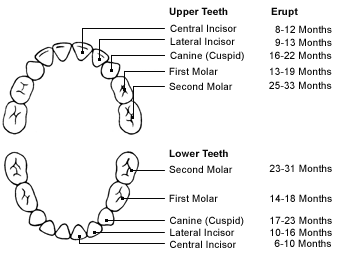
Do You Know Your Teeth?
The part of the tooth you see is called the crown. The rounded high parts of the back teeth are cusps. The hard white outer covering of the tooth is the enamel. Below the gumline, holding the tooth in the jawbone is the root of the tooth. You can't see the roots. The inner portions of the tooth consist of the dentin, a bonelike tissue, and the pulp. The pulp is like a house for the nerves and blood vessels at the center of the crown and root.
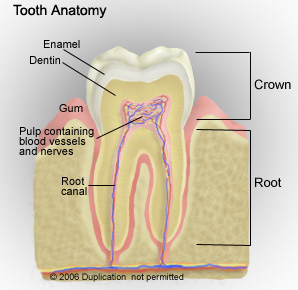
Teeth have different shapes for different jobs. For example, when you eat, the upper teeth work together with the lower teeth of the same shape to bite, chew, and tear food. The names of these teeth are
- Incisors There are eight incisors located in the front of the mouth (four on the top and four on the bottom). They have sharp, chisel-shaped crowns that cut food.
- Cuspids. The four cuspids are next to each incisor. Cuspids have a pointed edge to tear food.
- Premolars. Also called bicuspids, the four pairs of molars are located next to the cuspids. They crush and tear food.
- Molars. There are twelve molars, in sets of three, at the back of the mouth. They have wide surfaces that help to grind food.
Adults have 32 teeth. Depending on their age, children may have fewer because they lose baby teeth as adult teeth grow. In addition to chewing, teeth help you to speak clearly. The shape of the arch inside the mouth helps you talk. Many letters of the alphabet cannot be sounded without the help of teeth.
"Teeth also give your face its shape and add to the way you look. Not only do clean, healthy teeth help you look good, they contribute to total body health and well being. And a smile always helps you look your best."
Baby's First Visit!
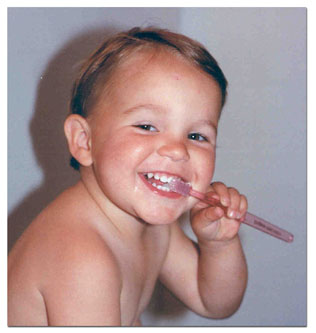
Your child's first set of teeth, the primary teeth, are extremely important. Strong, healthy primary teeth help your child chew food easily, learn to speak clearly, and look good. Just as important, your child's general health can be affected if diseased and broken primary teeth are not treated early. Regular dental visits can save time, money and your child's teeth.
At what age should my child first see a dentist?
Ideally, it is best to take your child to the dentist between six and twelve months of age. The earlier you begin, the better chance your dentist has to prevent problems.By starting dental visits at an early age, you will help your child build a lifetime of good dental habits.
How often should my child see the dentist?
While there is no set rule, it is generally recommended that children visit the dentist every six months. The frequency of dental visits will partly depend on your child's eating habits, how clean his or her teeth are kept and whether your child drinks fluoridated water.
How should I prepare my child for their first visit?
You play an important role in preparing your child for his/her first visit to us. The first visits to the dentist may be the most important in your child's life so we ask that you help by reinforcing our role as a "tooth doctor" who works to keep teeth healthy and happy.
- Be relaxed, your child will sense any anxiety on your part.
- Tell your child that we will "count" and "take pictures" of his/her teeth, and then talk afterwards about it.
- Don't over do it! Don't use words that may create fear in your child such as "hurt, injection, drill, X-ray, or needle".
- Don't relate any negative experiences you may have had as a child, and don't let other people tell your child stories that may provoke fear.
We are specially trained to handle children & you can rest assured we will treat your child as gently as we would treat our own.
What is your procedure with a child?
We will explain our procedures to your child in easy understandable terms before we actually do it. Remember, we are pediatric dentists, and children are our only patients, 'first class citizens' in our office.
At this first visit, we will answer any questions you may have and do a comprehensive examination of your child's mouth. This will include evaluating the supporting structures and the teeth themselves. Your child's bite (occlusion) will also be evaluated. Usually, we will clean a child's teeth at this first visit also. Application of topical fluoride will depend on the child's age and the need for X-rays (tooth pictures) will be determined on an individual basis (not routine). Subsequent appointments may be scheduled for cleaning, fluoride treatments, or other treatments as needed.
Your aim as a parent and ours as a dentist are the same. To keep your child's teeth and mouth in good health and to make the process "painless" for child, parent, and dentist!
What if my Child Cries?
Crying is a normal reaction to almost any kind of anxiety in a young child. New experiences, strange people and places fit in that category for the very young. Please do not let your child's occasional tears upset you as it is very common and we anticipate crying in some small children. The more relaxed we ( parent and dental staff ) are at that time, the sooner the child will overcome his/her anxiety. As a parent myself, I am aware that a crying child is often harder on us parents than the child itself. Trust me on this one! It will go away with time, in some cases it takes several visits, and no harm is done.
Pointers for Parents!
Don't!
- Bribe your child into going to the dentist.
- Use a dental visit as a punishment.
- Let the child know you feel any anxiety about going to the dentist.
- Let anyone tell your child scary stories about dental visits.
- Use words like hurt, pain, needle, drill, injection, etc.
Do!
- Try to make dental visits enjoyable for your child, we'll definitely help!
- Let your child go into the treatment room alone, if doctor prefers.
- Set a good example! Brush and Floss your own teeth daily, and visit the dentist regularly.
I and my staff can do a lot to protect your child from dental disease. By starting dental visits at an early age and making them regularly, you can help your child have strong, healthy teeth all throughout life.
Your Little Angel's Smile
Your baby can grow up cavity free if you start good dental care early. You've probably noticed just how important your baby's mouth is to them. Babies use their mouth for the obvious things, like eating and communicating their needs, but also for expressing feelings, exploring their world, and for their own personal security. Here we will take you through some of the important dental milestones you will go through with your baby, and teach you some of the things you can do to safeguard your baby's dental health.
You've probably noticed your baby derives much pleasure from sucking, and important and satisfying activity which is a normal part of their development. Babies begin sucking their thumbs and fingers before they are born. Sucking actually serves an important purpose, it helps strengthen and develop the oral muscles, which in turn helps position their teeth in the proper position as they appear. Whether you choose to let them suck a thumb or a pacifier really doesn't matter. If you choose a pacifier however, be sure:
- It is designed for safety! It should be constructed in one piece of a flexible but firm non-toxic material. The nipple and mouthguard should not be separate. It should also have an easily held handle or grip.
- The mouthguard should contain ventilating holes, and the pacifier should be large enough to prevent it from being sucked into baby's mouth.
- NEVER tie the pacifier around baby's neck.
- Should always be kept clean. Wash it before giving it to baby, every time. If it wears out, get a new one.
- Never sweeten it by putting honey or sugar on the nipple. This can cause baby bottle tooth decay, and cause serious damage to your child's teeth.
Most children give up the sucking habit at 4 or 5 years of age. If your child hasn't, they may need help with their oral habit. See your pediatric dentist immediately!
Teething
Around 6 months of age, your baby's first shiny white tooth will usually appear, typically in the front center of the lower jaw. This eruption of primary teeth (baby teeth – refer dental chart) is called teething.
Minor discomfort is associated with teething, and some of the symptoms you will see include irritability, sore or inflamed gums, excessive drooling of saliva, loss of appetite, a change in eating habits or difficulty in sleeping. These should not cause alarm and are to be expected. However, if your baby experiences other problems during the teething process such as rash, fever or vomiting, something else may be wrong. Consult with your pediatrician in those cases, and do not make the assumption it is due to teething.
The best thing to do to aid discomfort is to clean your baby's mouth with a damp gauze pad two or three times daily, and giving your baby a teething ring to chew on.
Caring for Baby's First Teeth
Good dental habits begin early, and by caring for your baby's mouth and teeth as early as you can, you will help baby develop good dental habits. You can use our checklist as a quick reference.
You should actually begin cleaning your baby's mouth with the first day of life. Wipe out the mouth gently and massage the gums pads after each feeding with before bedtime with a damp gauze pad wrapped around your finger or a damp washcloth. Hold your baby so that their head rests comfortably in your lap, this will aid stability and provide better visibility.
Begin cleaning baby's first teeth as soon as they appear through the gum. Continue to use a gauze wrapped finger or you may use a very soft bristled child-sized toothbrush. At this point in their life, it is not necessary to use toothpaste. Sometime after the first tooth comes in, and preferably not later than 1 year old, you should schedule your child for their first dental visit.
As teeth continue to come in, you may also begin gently flossing between the teeth that touch.
After teeth begin coming in, avoid sending your child to bed with a baby bottle unless it is water only. This can lead to a serious condition we see all to often called baby bottle tooth decay.
Baby Bottle Tooth Decay
As a pediatric dentist, one of the saddest conditions I see, and see all too frequently, is "Baby Bottle Tooth Decay". This single condition probably causes more pain and suffering in small children than all other conditions combined, and it is so easily preventable. Could anyone harm a child as precious as this one? No, of course not! None of us would harm our children's teeth and cause them severe pain intentionally, yet thousands of parents are doing this without knowing it. This section of our site is to help educate you about the dangers of Baby Bottle Tooth Decay, and the simple effective measures you can take to prevent this painful and dangerous condition from happening to your child.
What is baby bottle tooth decay and how does it occur?
Baby bottle tooth decay is a dental condition that can destroy the teeth of an infant or young child. It occurs when a child's teeth are frequently exposed to sugary liquids for long periods. Among these are milk (including breast milk),infant formula, fruit juice, soft drinks and other sweetened liquids.
When a baby is put to bed with a bottle, the liquid drips into the mouth continuously. It collects around the teeth as long as the bottle is in the mouth, and is like sending the baby to bed with a mouthful of candy.


Take a look at the above pictures. In the left photo, notice how all teeth are severely decayed except the lower ones. As a child sleeps with the bottle, his tongue covers the lower teeth, protecting them. When we see a mouth like this, as dentists we know the child has been sleeping with a bottle. Notice also how inflamed and swollen the gums are compared to a healthy mouth and teeth on the right.
Can all the teeth be affected?
The teeth most likely to be damaged are the upper front teeth, but other teeth can be damaged also. Your child's first set of teeth - the 'baby' or primary teeth - are very important in helping your child chew food easily, learn to speak clearly, and look attractive. Decay in primary teeth can affect our child's erupting permanent teeth, cause pain, and can be associated with general health problems in some children. Therefore, to avoid future problems, it's important to keep teeth healthy.
What causes decay to occur?
An invisible sticky film called 'Plaque' covers teeth. Bacteria in plaque use sugar to produce acids. These acids then attack tooth enamel. If sugary liquid is allowed to remain in the mouth, the bacteria have more time to produce acids that can attack the teeth. Tooth decay can then occur after frequent acid attacks.
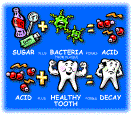
It's not just what children drink, but how often and for how long their teeth are exposed to decay-causing acids. That's why frequently offering your child a bottle containing sugary liquid as a pacifier, or allowing your child to fall asleep with a bottle during naps or at night, can do serious harm to the teeth.
What can parents do to prevent baby bottle tooth decay?
You can prevent this from happening to your child's teeth by learning how to protect them.
- Clean your child's teeth daily
- Never allow your child to fall asleep with a bottle filled with juice, milk, or infant formula (or when awake, sip on it for long periods of time as a pacifier)
- Start bottle weaning by at least a year
- Give your child plain water for thirst
- Make sure your child gets the fluoride needed to prevent decay
- Have regular dental visits for your child beginning when their first tooth erupts
Sealants to Prevent Cavities!
We feel strongly about prevention of tooth decay. Tooth decay is the most widespread dental disease among children, but also the most preventable. One of the methods we employ as a deterrent to tooth decay is a "sealant". A sealant is a plastic-like material which is painted on the tooth surface and hardened.
Because the back teeth have depressions and grooves on their chewing surfaces, which tend to trap food, they are difficult or impossible to clean and eventually develop decay. Sealants fill in the grooves and prevent this decay. Usually, sealants are applied on permanent molars right after eruption.
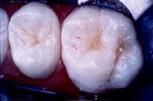

As you can see from the following diagram, the sealant forms a coating or barrier to protect the tooth from bacteria and bits of food. By protecting the depressions and grooves with a coating of sealant, we can dramatically reduce the risk of decay for children and teens.

The following will answer many of your questions about tooth decay and the use of sealants.
How do sealants work?
Even if your child brushes and flosses carefully, it is difficult - sometimes impossible - to clean the tiny grooves and pits on certain teeth. Food and bacteria build up in these depressions, placing you child in danger of tooth decay. Sealants "seal out" food and plaque, thus reducing the risk of decay.
Which teeth should be sealed?
The teeth most at risk of decay - and therefore most in need of sealants - are the six-year and twelve year molars. But any tooth with grooves or pits may benefit from the protection of sealants.
Oral Habits
As a pediatric dentist, I am trained to observe and look for any "oral" habits that may be occurring with your child, and to suggest any steps necessary to prevent the oral habit from causing any long term ill effects with your child's dental health or development.
When we speak of oral habits, we are typically speaking of any thumb, finger, or pacifier habits that may be causing damaging effects to the normal growth and development due to sucking or biting habits of the child. This type of sucking is completely normal for babies and young children as it provides a kind of security for them.
Most children stop sucking on thumbs, pacifiers, or fingers on their own between the ages of two to four years. No harm is done to their teeth or jaws. However, some children continue these habits much longer, and this is where problems can occur.
Habits can be responsible for a number of problems. Thumb and finger habits can cause an anterior open bite, facial movement of the upper incisors, lingual movement of the lower incisors, and constriction of the maxillary arch.
Lip sucking and lip biting can procline the maxillary incisors, retrocline the mandibular incisors and increase he amount of overjet.
Tongue thrusting and mouthbreathing may also play a part in the creation of a malocclusion. An anterior open bite is the most common dental problem associated with the anomalies.
As a pediatric dentist, we observe these habits in children, and stand ready to make recommendations should we feel the child is displaying these habits for too long a period of time. If so, we will suggest your child be fitted with a habit or mouth appliance specifically designed to block the sucking action, and in the case of nocturnal grinding, a splint or orthopedic appliance worn at night will be recommended to stop excessive wear on the teeth.
Space Maintainers
Baby teeth usually stay in place until "pushed out" by a permanent tooth that takes it's place. Unfortunately, some children lose baby teeth too early. A tooth may be knocked out accidentally or be removed due to severe disease. When this occurs, a space maintainer may be required to prevent future dental problems. Space maintainers encourage normal development of the jaw bones and muscles, and save space for the permanent teeth and help guide them into position.
How can losing a baby tooth too early cause problems for permanent teeth?
Teeth are strange in that regard. Teeth attempt to "fill" any space available to them. If your child loses a baby tooth to early, the remaining baby teeth may tilt, drift, or move up or down to fill the gap. When this happens, they fill the space intended for the permanent tooth, and the permanent tooth can come in crowded or crooked. And this condition, if left untreated, may require extensive (and expensive) orthodontic treatment (braces or even surgery).
What are space maintainers?
Simply put, they are an appliance made of plastic or metal custom fit to your child's mouth to maintain the space intended for the permanent tooth when it decides to come in. They do this by "holding open" the empty space left by a lost tooth by preventing movement in the remaining teeth until the permanent tooth takes it's natural position in the child's mouth. This treatment is much more affordable and much easier on your child than to move them back later with orthodontic procedures. Think of space maintainers as insurance against braces.
Do space maintainers require any special care?
Yes, they do, and you as a parent can help.
- Teeth should be brushed after each meal and clean the teeth with bands especially well.
- Once a day, a fluoride mouthwash should be used to help prevent decalcification of the teeth around the band and wire.
- Do not try to bend the wire for any reason with finger or tongue.
- Notify our office immediately if the bands come loose or the space maintainer is damaged in any way. If a tooth erupts under the wire this also needs to be checked.
- AVOID HARD/STICKY FOODS!!!!
Dental Care for the Special Child
One of the more important services I provide is dental care for special children (Developmental Disabilities). Many special children are extremely susceptible to dental disease or oral injury, while others require medication or special diets that may be detrimental to dental health. As a pediatric dentist, I have received specialized training to focus on the special needs of your special child.
Special children can benefit from many of the same preventive measures recommended for all children. We will be happy to design a preventive care plan for your special child so that they may enjoy a lifetime of good dental health.
We will happily discuss a program of treatment with you for your special child, in order that they may live healthier and happier with good dental health. Every child deserves a healthy smile.
TIPS
CLEANING YOUR BABIES TEETH
Should children use a different toothbrush than adults?
Children should use smaller brushes with shorter brushing planes in proportion to the size of their mouths. Most children use brushes that are too big to be easily maneuvered into small spaces in their mouth.
Should children use the same toothpaste as adults?
All that you need from your toothpaste is the fluoride that helps strengthen your teeth and protects them from cavities. The time you should spend brushing and your technique are more important, so go with the flavor you prefer. Remember only a pea-sized drop of paste on your brush is all that is necessary.
How many times each day should teeth be brushed? And When?
The two really important times to brush your teeth are in the morning after breakfast and at night before you go to bed. Any extra times you brush during the day is great particularly after eating stick and sugary foods.
Should I clean my baby's teeth?
Definitely. Even before the first tooth appears, use a soft, clean cloth to wipe your baby's gums and cheeks after feeding. As soon as the first tooth appears, begin using a small, soft bristled tooth brush to clean the tooth after eating. Don't cover the brush with toothpaste. Young children tend to swallow most of the toothpaste, and swallowing too much fluoridated toothpaste can cause permanent spots on their teeth called dental fluorosis
I find brushing my child's teeth awkward. Any suggestions?
Try having your child lie down. Put your child on your lap or on the floor, keeping his/her head steady with your legs. If your child is standing, have his/her back to you with their head tilted slightly and resting against your body. Have your child hold a mirror while you brush and floss their teeth so your child can see what is being done.
Is it important to brush before bed?
Yes. If you have to miss a brushing, the bedtime one is probably the worst one to miss. If you don't get rid of the bacteria and sugar that cause cavities, they have all night to do harm. While you are awake, saliva helps keep the mouth clean. When you are asleep, there is less saliva produced to clean the mouth. For this reason it is important to brush before bedtime.
How to brush your child's teeth effectively:
- Every day plaque forms on the inner, outer, and chewing surface of teeth and the gums. Tooth brushing is one of the most effective ways to remove the plaque.
- The best kind of toothbrush to use is one with soft, round-tipped bristles.
- A child will need a smaller brush than an adult.
- Young children do not have the manual dexterity to brush properly. Your child will need your supervision and help brushing until he or she is 8-10 years old to ensure a thorough brushing has been done.
- When the bristles become bent or frayed, a new brush is needed.
- Start flossing your child's teeth when the teeth touch each other and you can no longer brush in between them.